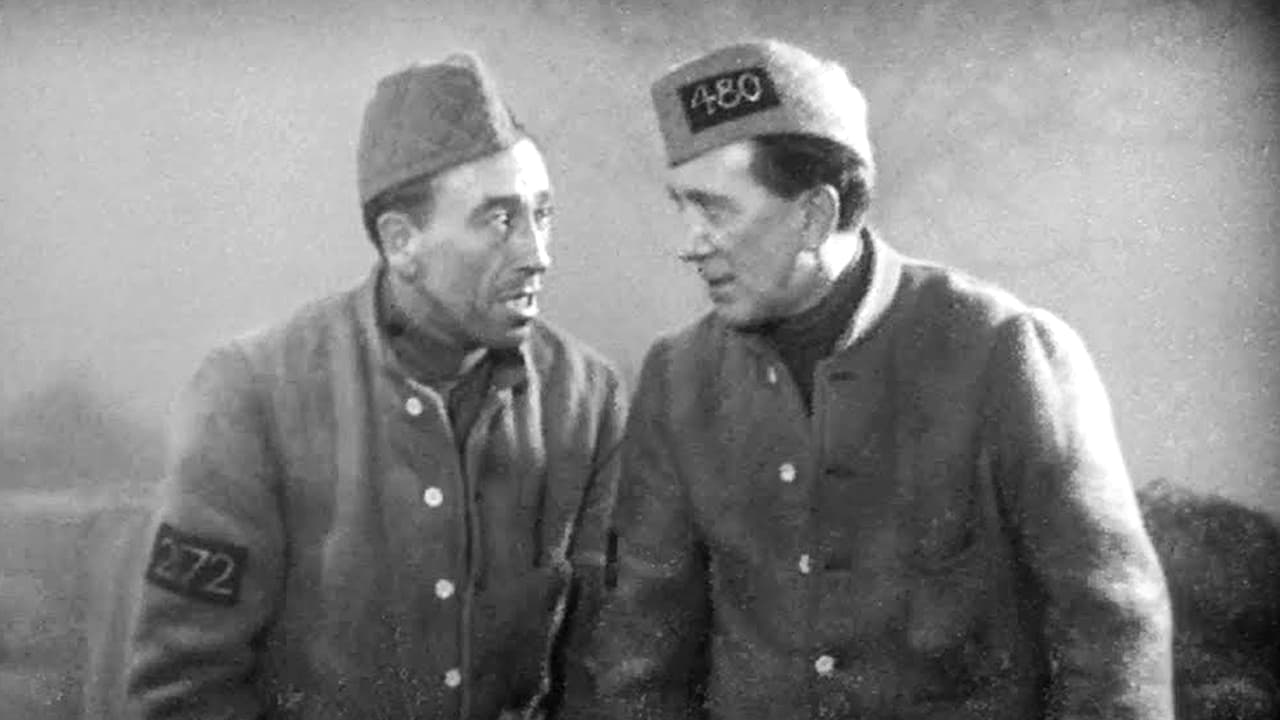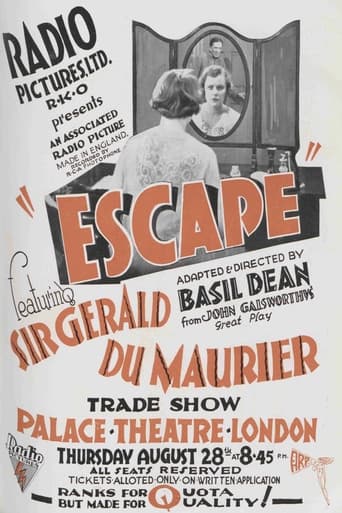




That was an excellent one.
A bit overrated, but still an amazing film
Your blood may run cold, but you now find yourself pinioned to the story.
View MoreOne of the best movies of the year! Incredible from the beginning to the end.
View MoreIf an "official" list of Ealing films were created, this would be at the beginning; though it was filmed at Beaconsfield as the London site was still under construction. Famed theatre director Basil Dean had conspired with American studios RKO to form Associated Talking Pictures (ATP), which the US company hoped to use to produce talkies with British thespians which could be distributed in both the UK and the US. 'Escape' was the first picture to fall out of this agreement, and was produced in 1930. Though Alfred Hitchcock's 'Blackmail' usually takes credit for being the first talkie produced in Britain, his film was actually produced as a silent, and it was due to Hitchcock's foresight that he introduced sound during filming. However, 'Escape' was conceived as a talking picture from the beginning, and, as Dean later proudly proclaimed, it was the first talking picture to be shot on location, with scenes taking advantage of the Dorset countryside.To use as a story for this important first ATP film, Dean turned to his friend John Galsworthy, and after much persuasion managed to gain the rights to adapt his play. It was also vital that Dean harnessed the very best of British acting talent, which meant turning to the theatre. He achieved a considerable feat in enrolling a then-giant of the stage, Sir Gerald du Maurier, to play the lead role. du Marier, like most theatrical actors of the period, looked upon the cinema with contempt, but due to a number of unwise financial investments, found the opportunity too good to refuse. His experience on 'Escape' must have done little to improve his opinion, as the old theatrical knight was forced to roll around in mud for take after take in, only to find an entire days' filming rendered unusable due to the incorrect configuration of the primitive sound recording equipment. du Maurier plays Matt Denant, a man who is imprisoned for assaulting a policeman whilst defending the integrity of a woman (in scenes shot on location in (I believe) Hyde Park). After two years he is presented with an opportunity to escape in thick fog, and we follow his exploits across the countryside, relying on the generosity and discretion of those he encounters to remain at large. A pre-39 Steps Madeline Carroll has a particularly memorable role as a girl who allows Denant to hide in her bedroom.Basil Dean's eight years at the helm of a pre-Michael Balcon Ealing are often unfairly disregarded as providing nothing but George Formby and Gracie Fields pictures. He directed 'Escape' himself, and with minimal experience, and in what must have been a challenging shoot on location with actors unused to working away from a warm, comfortable stage, he managed to conjure a perfectly entertaining film. We start by witnessing a fox hunt, which foreshadows Denant's fox hunt, and there are shades of Powell and Pressburger's 'Gone to Earth' (1950) in these opening scenes. He admirably achieved his aim of showcasing the English countryside. Alas, there is no evidence here to display Gerald du Maurier's acting ability, despite the fact that this is probably his best role in the few films he made before his death in 1934.
View MoreThis is the first film on Volume One of The Ealing Studios Rarities Collection that I have been collecting over the last 5 years or so and on viewing it as the first one I then had doubts as to should I have invested so much money in getting the whole set because to be quite frank this film is awful!! And I simply do not understand why the other reviewers gave it a favourable write up.Wooden acting, stilted dialogue, it made me think I was watching a film of some local AmDram production that had spilt over from the local village hall into the village and local countryside.Interesting to see Gordon Harker in a small part before his excellent Inspector Hornleigh three (only!) films and a barely recognisable Nigel Bruce who went on of course to be the bumbling Dr Watson to the excellent Basil Rathbone's Sherlock Holmes (in my opinion the best). So, apart from having a cigarette named after him and fathering Daphne Du Maurier, Sir Gerald should have stayed the other side of the camera as far as I am concerned.
View MoreThe noted theatre director,Basil Dean,helped form Associated Talking Pictures and built new sound stages at Ealing Studios.He signed a distribution contract with Radio Pictures ,the British subsidiary of RKO,with the hope of producing prestige British films.The cast for this film easily convinces one of that fact.However what RKO had in mind is that this would be a way of complying with their quota requirements,so the films from Ealing could go out on the bottom half of a double bill with one of their Hollywood films.So it was not a surprise that a parting of the ways came a couple of years later for RKO and 5 years later for Dean after a string of disastrous flops,mainly starring his wife. This film is more interesting for the cast than for the content.As has been pointed out in another review Mabel Poulton coming to the end of her screen career halted by her voice.Other actors such as Nigel Bruce,Ian Hunter and Madelaine Carroll on their way up. Du Maurier is excellent,even if a bit unlikely as the convict.Whilst the film creaks with age nevertheless it is very watchable.
View MoreInteresting Brit talkie starring Gerald du Maurier as a prison escapee. The film is also notable as the beginning of the end of Mabel Poulton's career. She gets second billing after 2 talkie bombs in 1929. But her billing is misleading as the billing is based on order of appearance. While she is perfectly fine as "Girl of the Town," it's obvious that her speaking voice undermines her silent-screen image, especially as Tessa in The Constant Nymph. She never had another leading role in a feature.Poulton aside, what we get is the perfect Hitchcock theme sans Hitchcock. After an extended British hunt scene showing du Maurier as a sensitive soul (he feels sorry for the fox because he himself had escaped the Germans in the war), we see him accosted by Poulton in Hyde Park. Nothing happens but a cop (Ian Hunter) tries to arrest her for soliciting. Du Maurier intervenes and strikes the cop. He falls, hits his head on a wall and dies. Du Maurier is sentenced to 5 years. He escapes and the rest of the film follows his flight across the moors and the people he meets.Du Maurier was a legendary actor of his time, knighted in 1922, and totally forgotten now. He made only 10 films and this was his talkie debut. So while the film marks a solid starring talkie debut for du Maurier, it also signals the complete collapse of Mabel Poulton's film career (she having been one of England's biggest silent stars).Also in the cast are Edna Best, Madeleine Carroll, Nigel Bruce, Gordon Harker, Austin Trevor, Marie Ney, Jean Cadell, and Felix Aylmer.
View More